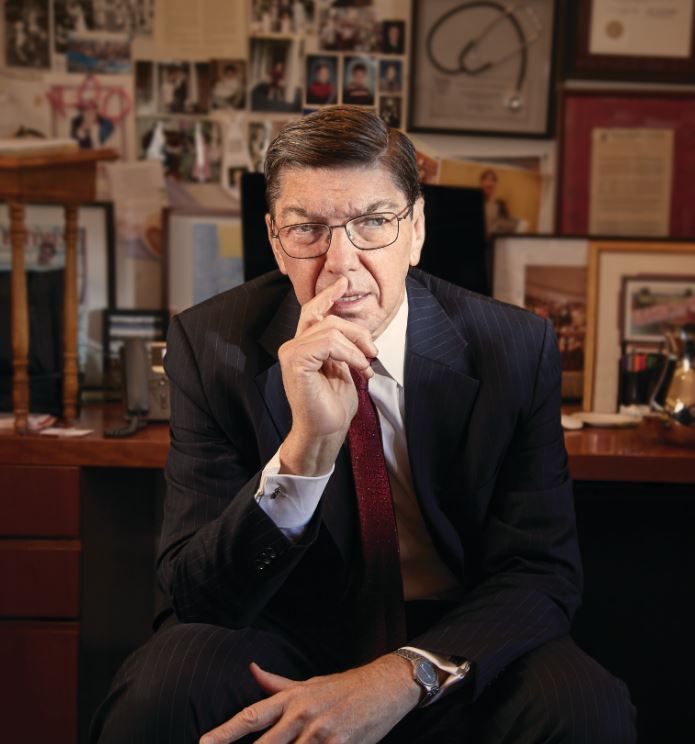So how do CEOs and boards build this?
Christensen: Everybody, including me, wants to find a Holy Grail. “Show us a company that has done this over and over again.” There are very few and it’s ephemeral. IBM, they had a mainframe, and then they had a workstation, and then a personal computer. IBM made their mainframes in Poughkeepsie, New York and the mini-computers in Rochester, Minnesota. In Poughkeepsie they generated gross margins of 60 percent. [Rochester] had a gross margin of 45 percent. Then the personal computer that they made in Florida had a different profit model of 25 percent.
Then the smartphone. Do any of you guys have an IBM smartphone? Find a smartphone made by IBM.
What happened?
Christensen: The board started focusing on [returns]. They wouldn’t create a different business model that had a different profit formula.
What are some of the things you can be doing to prevent this from happening to you?
Christensen: Well, I’m coming at you from an academic perspective, which has its limits, but if I were a CEO, I’d take my board somewhere on an island in the Great Salt Lake or something once a year and talk about these principles and report to them on where each of these are: “Where’s disruption happening?”; “We need to grow, how are we gonna do it at that level?” precisely because of the ossification.
You think, “We’ve got to get these returns,” and then you think, “We have to do it in this way.” And when you say, “It has to be done in this way,” then you’re dead. So I’d figure out a way to get people together, teach them the models, not one model but multiple models, just what’s the job to be done? Come to that every year to be sure that we’re organized in the right way.
Is there a good example of a way to structure the lifeboat?
Christensen: Yeah. I would say on this that Intuit is run by a CEO, Scott Cook, who understands this stuff better than I do. They’ve done Quickbooks and TurboTax and a number of other organizations that they set up separately to give the flexibility.
If I were a doctoral student again, I’d go to Microsoft. The CEO, [Steve Ballmer], he couldn’t see the disruption. Yet, they had enough cash and profit that they could try a new model and another new model. Within about five years they figured out that things are going up to the cloud whether we want to get on that bus or not. I think that they would say that the theory got deep enough in their minds that they actually didn’t sort of need to kill themselves. In contrast, IBM, their model is so…it’s a sad story, but it doesn’t have to be sad.
You’re fundamentally optimistic about humankind and where we are. What is it that makes you optimistic that there are solutions to be found, that there are new innovations that can continue to change the world?
Christensen: Personally, I have a propensity to try to figure out the causal mechanism behind good phenomena. One day, just on my own, I decided that God doesn’t hire accountants in heaven. What I mean by that is you and I have finite minds and we have to hire accountants to calculate what the invoices coming in and going out need to be and are we winning or losing on gross margins. We have to hire accountants because we have limited minds, we can’t keep all of the detail in our minds at once. We get a sense of hierarchy. So people who are presiding over bigger numbers tend to be viewed as more important than people who preside over smaller numbers. That’s the way we’ve organized our lives.
I realized that God has an infinite mind and because God has an infinite mind he doesn’t have to aggregate people into numbers. For me, that has just been a driving, truly a driving insight, that God does not have to aggregate people but rather, at the level of individual people, God can understand completely what’s going on in this world, he has an infinite mind. Therefore, I better get busy and figure out how I will measure my life so that at the end of my life when God looks at what I accomplished, it will always be assessed at the level of individual people.
My hope is that if that’s the way you think about life, then you as a manager are in a marvelous position. Because every day, I go home from work and think about how could I help the people who work for me to become good people that day?
The innovation in the middle of that stuff is really important to help people become better people because you always want to give them more opportunities. If you believe in God, then you have to go through this logic about how God will assess my life. I think it makes me…it drives me to be a better manager.
God flattens the hierarchy?
Christensen: Yeah. Exactly.
Read more: Jeff Bezos On Innovation: Five Big Takeaways







